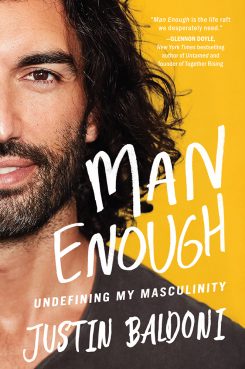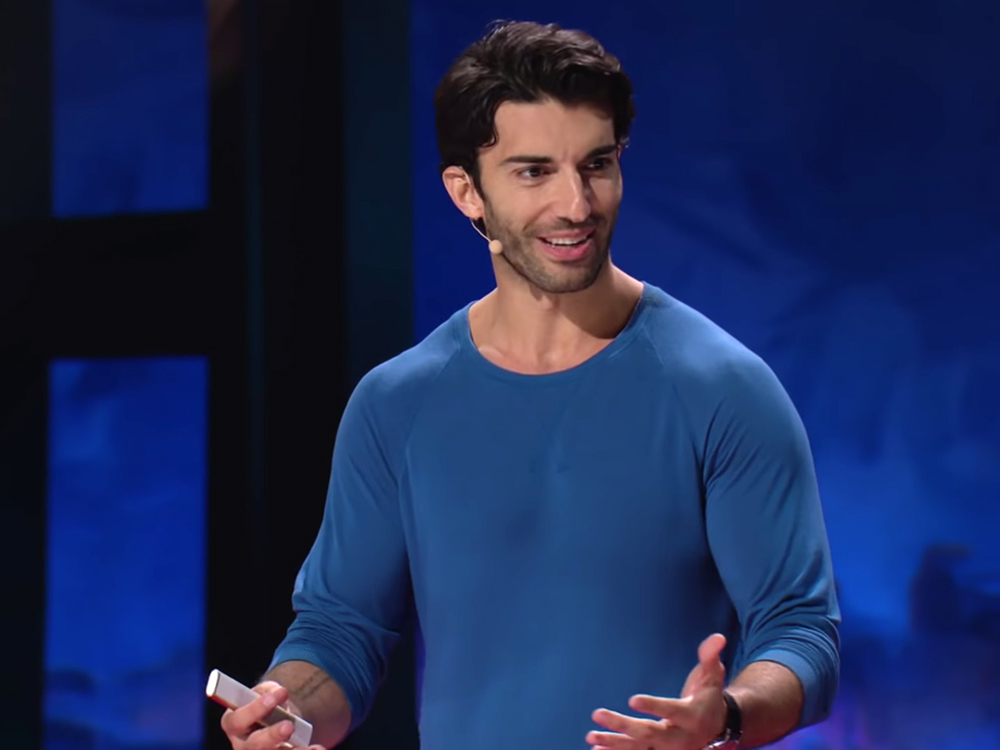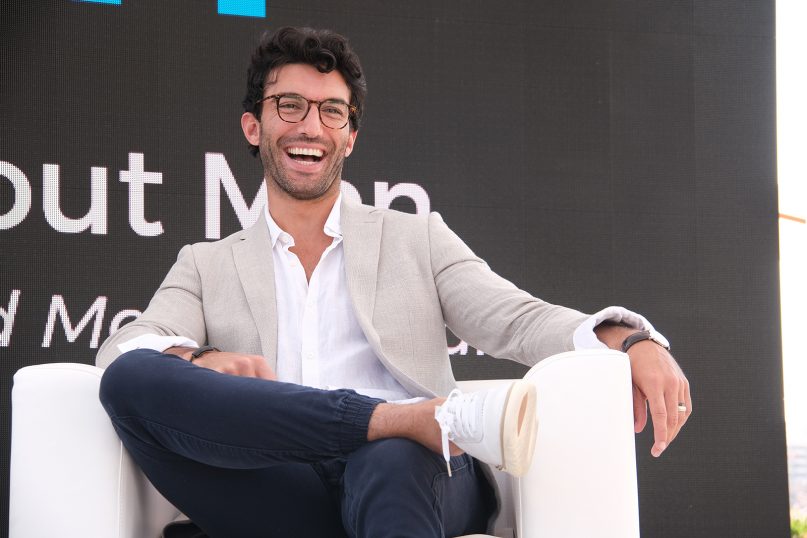(RNS) — Before Gillette aired its “We Believe: The Best Men Can Be” ad aimed at toxic masculinity, two years before The New York Times ran its explainer, “What is Toxic Masculinity?” — even before Tucker Carlson could put a fright into his viewers with the phrase — Justin Baldoni recorded a TED talk on the topic, in which the television actor known for his role on ABC’s “Jane the Virgin” challenged men to be “man enough to just shut the hell up and listen.”
TED Talks posted a two-minute clip that got 50 million views. The talk itself has scored more than 8 million views around the world on a variety of social media platforms.
Now Baldoni has published a book, “Man Enough: Undefining My Masculinity,” originally to be patterned after the web series of the same name, fashioned out of dinner conversations with male celebrities and friends, that pushed past normal guy talk to sensitive discussions. “I didn’t feel smart enough or well-read enough to write a book,” Baldoni said in a recent interview with Religion News Service. Instead, he’d invite men to do the talking.
RELATED: In Disney’s ‘Clouds,’ Justin Baldoni makes a teen cancer movie about joy
But Baldoni, who readily quotes the scripture of his Baha’i faith, found inspiration in a saying of the prophet Baha’u’llah — “Love never dwelleth in a heart possessed by fear” — to write a book as part confessional, part motivational guide that would encourage his male readers to “take that journey from our head to our heart.”
How did you come to be interested in the topic of masculinity?

“Man Enough: Undefining My Masculinity” by Justin Baldoni. Courtesy image
I was tired of hurting the people I loved and hurting myself, tired of changing how I acted based on who I was around. It came out of a lifetime of questioning if I’m brave enough, smart enough, successful enough, big enough, strong enough. I had to start doing, as I say in the book, the hard work of heart work, of figuring out why I was struggling so much to be the man I believe God wants me to be, that I want to be.
That’s how the TED talk was born?
When I was doing the series “Man Enough,” I would talk about my daughter and my dreams for her, and I noticed that women were heaping praise on me. I would talk about my love for my wife, and women would freak out and say, “Oh, my God, I wish my husband did that for me.” Which shows you how low the bar is.
At the same time that the women were heaping praise on me, men were dissing me. But the kicker was that men were privately writing me, thanking me, saying, “I feel you, you’re speaking so much of what I’ve been thinking.” I got invited to do the TED Talk, and that amplified and multiplied by millions.
Isn’t there something funny about a man writing a book about his experience of masculinity? Aren’t we learning that men have to listen?
Those are two different conversations. I believe wholeheartedly that men need to shut up and listen to women. But men need to stand up and talk to each other. Think about racism. Black folks are still trying to convince everybody that we live in a racist culture. Now, is it the job of a Black person to advocate for themselves about their oppression? Or is it the job of the white person to reach out to other white people and advocate on behalf of Black people?
It’s the same thing for this conversation. Women have been fighting for true gender equality and equity forever. Is it their job or ours to question and fight for them?
What is the conversation you want to have about masculinity?
It’s about the way we teach our boys to be almost robotic, to drown out our sensitivity and our emotions. If God wanted to infuse life into a robot and make it a person, all he’d do is take the qualities that we deem feminine — empathy, compassion, sensitivity, and put those into that robot. Men are taught, in what Bell Hooks called a psychic act of self-mutilation, to cut off the parts of us that are human in order to be men.
You were raised in the Bahaʼi faith. How does it inform how you think about being a man?
One of the founding beliefs of the Baha’i faith is the independent investigation of truth. As human beings, we’re given the ability to understand and investigate truth for ourselves. And I was raised to believe in the equality of women and men. Abdu’l-Baha, the son of the prophet Baha’u’llah, says that humanity can be likened to two wings of a bird, one wing female and the other male. It’s not until the wings are equal in strength that the bird can fly.
Abdu’l-Baha goes on to say things like, in the past, humanity has been ruled by force and domination. We’ve been living in a very masculine age, but the future will be an age that could be considered more feminine, where the qualities that women are strong in — sensitivity, empathy, compassion — will flourish.

Justin Baldoni speaks at TEDWomen 2017 — Bridges at the Orpheum Theatre in New Orleans, Louisiana, in Nov. 2017. Video screengrab
How do men figure in that kind of world?
That’s really what my book is about. It’s about looking at who we are as human beings and as men, and saying, “OK, you can be masculine, but not at the expense of your humanity. And if the feminine is considered to be weak, or less than, and yet the feminine is really the part of us that makes us human, then we have to really ask ourselves, is that serving us?
Where did your own ideas about manhood come from?
I got a lot from my dad, who learned from his dad. My grandfather was an Italian immigrant who came to America in 1912 and ended up becoming a state senator in Oregon. He didn’t want to be seen as an immigrant — this was the time of the origins of the Ku Klux Klan — and he raised my dad to be impervious, not show weakness. My dad never allowed me to see his mistakes. Everything was perfect to the outside world. There’s a cognitive dissonance that happens as a young boy growing up in that. You feel like you’re flawed and always messing up.
What about American pop culture?
You know, I watched Jean-Claude Van Damme movies over and over and over again. I’d watch all of Stallone’s movies, Schwarzenegger’s movies. These were my idols. That was masculinity, right? You get the girl in the end. The whole movie builds towards that one big explosion and that kiss. That’s what we were taught. Paul Rudd playing Ant Man, thank God for that.
In the book you talk about the importance of confidence.
I think confidence is important, but I don’t see a lot of confident men. I see a projection of competence or, on social media, keyboard courage. What is confidence anymore? Competence? Essentially we’re saying that men need jobs to feel confident, and making a case for the fragility of the male ego — “Oh, well, we don’t have jobs anymore. How can we be confident?”
RELATED: Four young people of different faiths move into a home together, then a pandemic happens
I believe men should be competent. But confidence comes from a belief system, from faith. I think confidence comes from believing you have a purpose, and believing that you are enough and that you have value.





